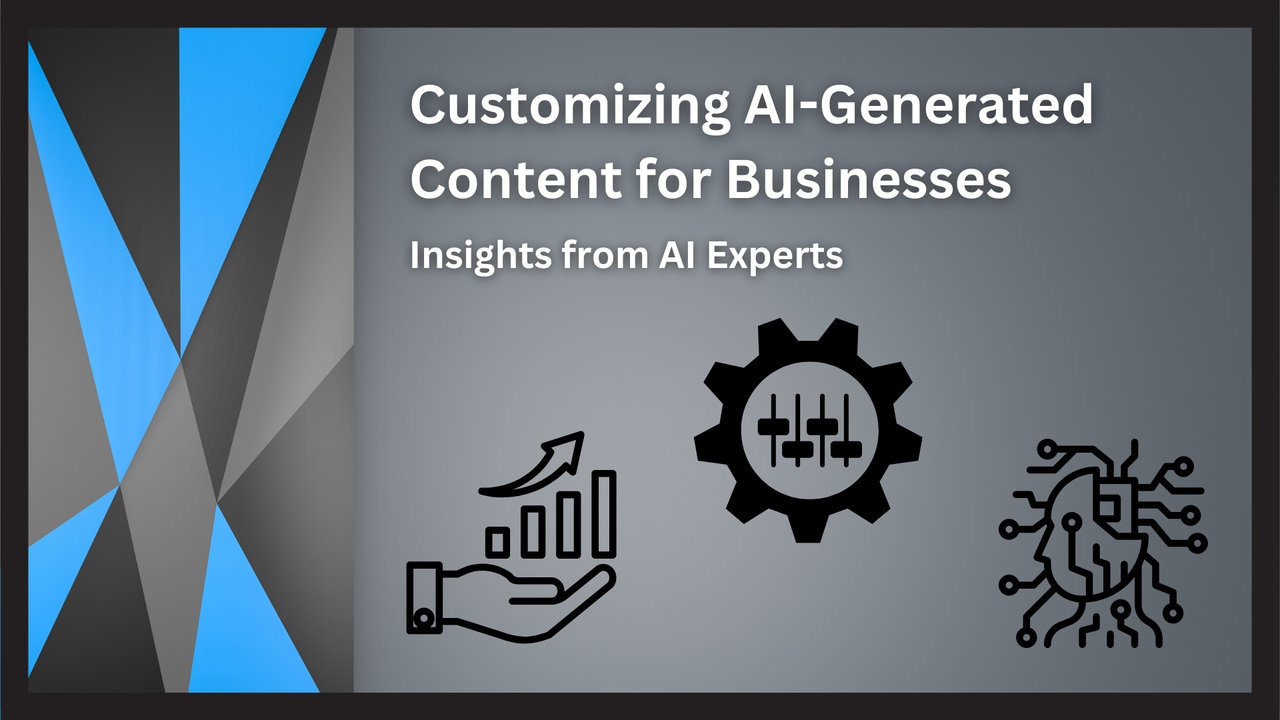

This article will cover:
In the rapidly evolving landscape of artificial intelligence, businesses are increasingly turning to AI-generated content to streamline their marketing efforts and enhance customer engagement. However, the challenge lies in customizing this content to align with a brand's unique voice and values. This article explores expert insights on effectively customizing AI-generated content for businesses, the role of platforms like AI4Chat, and the challenges faced in adapting AI content to niche industries.
Experts agree that customizing AI-generated content to align with a brand's voice requires a multi-faceted approach. Julie from AI Fire emphasizes the importance of training AI models on specific brand guidelines, terminology, and customer interaction examples. This sentiment is echoed by Rajeev Aluru, Director of AI projects at Smartbridge, who likens the process to setting specific parameters in data analysis tools.
Mitchell Cookson, Co-founder of AI Tools Inc, stresses the importance of a well-documented brand voice that includes tone, language, and messaging standards. He suggests fine-tuning AI models using custom datasets drawn from a company's existing content. This approach helps the AI learn how to produce on-brand material consistently.
YannickHabraken, a UGC expert, offers a practical perspective, suggesting that AI-generated content should be viewed as a starting point. He recommends defining the brand voice first and then altering the AI's output to fit the desired tone and style. This approach is particularly useful for User Generated Content (UGC) campaigns, where rapid iteration is essential.
AI4Chat distinguishes itself by offering a wide range of customization options that cater to various content needs across different platforms. Julie from AI Fire notes that AI4Chat's ability to integrate with multiple AI models allows users to switch between different styles and formats based on content requirements. This flexibility is particularly valuable for businesses aiming to maintain a consistent brand voice across all customer touchpoints.
Mimi Nguyen, Founder of Cafely, highlights AI4Chat's "all-in-one" reputation, praising its ability to generate various content types, including chat, images, videos, and even music. She notes that AI4Chat acts as a bridge to other AI-powered tools and models, allowing users to create and customize their own workflows easily.
Rajeev Aluru adds that AI4Chat allows businesses to tweak AI models using their own industry-specific data, providing more control compared to generic AI platforms. Its smooth integration with CRMs and API-driven workflows facilitates large-scale content personalization, enhancing customer service capabilities.
Adapting AI-generated content to niche industries presents several challenges. The primary concern, as highlighted by Julie from AI Fire, is ensuring accuracy and relevance in industries with specialized vocabularies and complex topics. This often requires training AI with industry-specific data and collaborating closely with AI developers to fine-tune the models.
Rajeev Aluru emphasizes the need for highly specialized data, particularly in sectors like energy, healthcare, and manufacturing. Industrial AI, for example, requires understanding of specific jargon, regulations, and technical details that are not typically covered by broad datasets. Compliance with industry standards and regulations adds another layer of complexity. For instance, sectors like healthcare especially when implementing healthcare AP automation and SaaS must often align with SOC 2 compliance standards, which emphasize security, availability, confidentiality, and privacy—critical pillars for managing customer data in regulated environments.
YannickHabraken points out the challenge of AI's capability to deal with specific, localized language and nuances. He suggests that human oversight is crucial to fine-tune the content, ensuring accuracy and trustworthiness, especially in niche industries.
Mimi Nguyen raises concerns about content authenticity and originality. Even with personalization efforts, AI-generated content may still be detected as such, potentially leading to ethical concerns. She recommends incorporating as much human touch as possible into every piece of content.
As AI-generated content becomes increasingly sophisticated, the field of AI detection is also evolving. Balázs Keszthelyi, Founder & CEO of TechnoLynx (You can find them here: www.technolynx.com), notes that AI detectors have significantly advanced, now incorporating complex models that can analyze linguistic nuances and contextual clues. However, he also points out the challenges in detecting content that has been humanized using tools like GPT Bypass.
Looking ahead, Keszthelyi envisions a future where AI detection will involve a more collaborative approach, combining human oversight with advanced AI technologies. This may lead to the development of hybrid systems that integrate various detection methodologies, enhancing overall accuracy.
In conclusion, while AI offers powerful tools for content generation, successful implementation requires a careful balance of technology and human expertise. Businesses must invest in customizing AI models to align with their brand voice, leverage platforms like AI4Chat for enhanced flexibility, and remain mindful of the challenges posed by niche industries. As the field continues to evolve, a commitment to ethical practices and ongoing adaptation will be key to harnessing the full potential of AI-generated content.